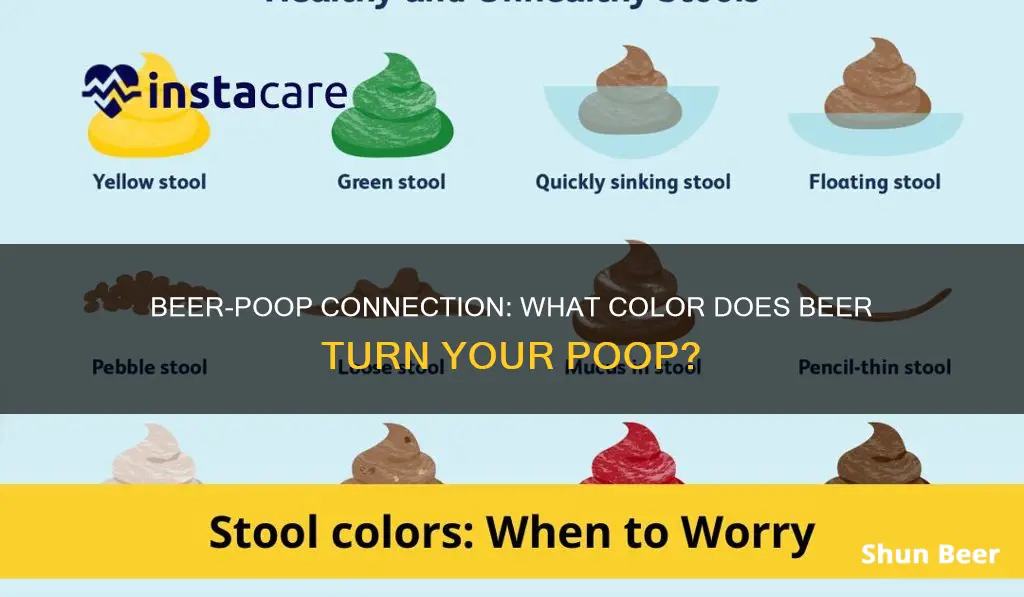
Alcohol can have a notable impact on the colour of your poop. While the shade of your stool can vary depending on diet, with beets, cranberries, and leafy greens, for example, known to cause a change in colour, alcohol can also be a contributing factor. Drinking alcohol can speed up the digestive system, leading to a bowel movement. As a result of this faster process, the body may be unable to absorb the normal amount of water, resulting in a loose, watery stool. This can cause a sense of urgency and lead to diarrhoea. Additionally, alcohol can cause constipation as it is a diuretic, making the body produce more urine and lose fluids. This dehydration can result in harder stools that are difficult to pass. The impact of alcohol on bowel movements can be worse for those with gut problems, such as irritable bowel syndrome (IBS), and some individuals may be intolerant to certain types of alcohol.
| Characteristics | Values |
|---|---|
| Colour | Unusually green, red, or even blue |
| Consistency | Loose, watery stool |
| Frequency | More frequent bowel movements |
| Sensation | Urgent need to poop |
What You'll Learn

Beer and malt liquor are worse for DADS (day-after-drinking stool)
Alcohol can have a significant impact on bowel movements, and the type of alcohol consumed can play a role in this. Beer and malt liquor, in particular, are known to be worse offenders when it comes to day-after-drinking stool issues, or DADS.
Beer and malt liquor contain a high volume of complex carbohydrates. When consumed in large quantities, these carbohydrates can overwhelm the small intestine, leading to an increased risk of digestive issues. The ethanol in alcohol also speeds up the digestive process, giving the colon less time to absorb water, resulting in watery stools. This can be further exacerbated by the high carbohydrate content of beer and malt liquor, as any carbohydrates that are not broken down in the small intestine will be fermented by bacteria in the large intestine, leading to gas, cramping, and diarrhea.
Additionally, alcohol can irritate the intestinal lining, leading to inflammation and further digestive problems. This irritation can be particularly problematic for people with irritable bowel syndrome (IBS) or other gastrointestinal issues. Alcohol can also cause dehydration, which is a common cause of constipation.
To avoid DADS, it is recommended to drink in moderation, stay hydrated, and avoid drinking on an empty stomach. It may also be helpful to avoid drinks with high sugar or caffeine content, as these can further irritate the digestive system.
While the occasional loose bowel movement after drinking beer or malt liquor is not a cause for concern, it is important to consult a medical professional if diarrhea persists for more than a day or if there are any signs of blood in the stool, as this could indicate a more serious health issue.
Beer and Pot: Mixing, Matching, and Safety Tips
You may want to see also

Ethanol speeds up the digestive process
The faster digestive process means the colon has less time to absorb water, which can result in a desperate need to go to the bathroom. This is often referred to as the "day after drinking shs" or DADS.
The high volume of carbohydrates in beer and malt liquor, combined with the accelerated digestive process caused by ethanol, means that some of the carbohydrates may enter the large intestine without being broken down. Bacteria in the large intestine then ferment these remaining carbohydrates, resulting in gas, cramping, and diarrhea.
While a few loose bowel movements are not a cause for concern, if diarrhea continues for more than a day, it is recommended to consult a medical professional.
To avoid digestive issues caused by ethanol, it is advisable to drink in moderation, avoid drinking on an empty stomach, and stay hydrated by drinking plenty of water.
Beer and Advil: Safe Mix or Health Risk?
You may want to see also

Alcohol can irritate the gut and cause inflammation
Chronic alcohol consumption can have more severe consequences, potentially leading to a condition called leaky gut syndrome, where the mucosa becomes more permeable, and decreasing the stomach's ability to destroy harmful bacteria. This can have system-wide effects, contributing to multiple organ dysfunctions and chronic disorders such as chronic liver disease, neurological disease, gastrointestinal cancers, and inflammatory bowel syndrome. Alcohol-induced intestinal inflammation may be at the root of these alcohol-related health issues.
Germans and Beer: A Daily Affair?
You may want to see also

Alcohol can lead to dehydration and constipation
Alcohol can affect your bowel movements in several ways, and one of the main reasons is dehydration. Alcohol is a diuretic, which means it causes your body to produce more urine than usual. This can lead to dehydration, as you're losing more fluids than you're taking in. Dehydration is one of the primary causes of constipation.
When you drink alcohol, your body is unable to release vasopressin, a hormone that helps regulate water retention by preventing water loss through urine. With less vasopressin, you'll need to urinate more frequently, and your body will be getting rid of more fluid than usual. This fluid loss can lead to constipation, as the large intestine will try to absorb as much water as possible from waste before it leaves the body. This reabsorption process results in hard, dry stools that are challenging to pass.
The type of alcohol you consume also matters. Drinks with a high alcohol content, typically more than 15%, may slow down the movements of the muscles in your gut that push food through your digestive system. This slowdown can further contribute to constipation. Additionally, the ethanol in alcohol speeds up the digestive process, causing the contents of your stomach to pass through the intestines faster. This rapid transit gives your body less time to absorb water from the waste, again leading to a more solid and challenging stool.
To prevent alcohol-induced constipation, it's essential to stay hydrated by drinking plenty of water or other fluids before, during, and after consuming alcohol. Drinking in moderation is also crucial, as excessive alcohol intake can irritate the gut and cause inflammation in the lining of the intestines, further impacting your body's ability to absorb water and nutrients. Eating a meal before drinking alcohol can also help protect your gut and promote more regular and healthier bowel movements.
Expired Beer: Is It Safe to Drink?
You may want to see also

Alcohol can cause blood in the stool
Alcohol can have a significant impact on bowel movements and can affect all systems within the body, including the gastrointestinal (GI) tract. Drinking alcohol can cause diarrhoea, constipation, and even blood in the stool.
One of the main reasons alcohol affects bowel movements is dehydration. Alcohol prevents the body from releasing vasopressin, a hormone that helps the body retain fluid by preventing water from leaving the body through urine. This results in increased urination, which can lead to dehydration and constipation.
Additionally, alcohol can irritate the intestinal lining, known as the epithelial layer. When this lining becomes irritated, it loses some of its absorptive properties, leading to an increased need to expel waste. Alcohol also increases gut motility, causing the contents of the colon to move faster, resulting in softer stools and a more urgent need to defecate.
Chronic alcohol consumption can have more severe effects on the digestive tract. It can make the mucosa more permeable, potentially leading to a condition called leaky gut syndrome and impairing the stomach's ability to destroy harmful bacteria. Long-term alcohol use can also lead to internal bleeding in the GI tract. This bleeding can occur anywhere in the digestive tract and may be life-threatening. The blood in the stool may appear bright red, indicating blood in the lower part of the digestive tract, or it may turn dark or black by the time it reaches the large intestine, indicating bleeding in the upper GI tract.
If you notice blood in your stool after consuming alcohol, it is important to seek medical advice, as it could indicate a more serious condition such as haemorrhoids or another problem in the intestines.
Archie Bunker's Beer: What Did He Drink?
You may want to see also
Frequently asked questions
The color of your poop can vary depending on your diet and the presence of certain substances in your body, such as bile. Alcohol can affect the color of your poop, but it typically falls within the normal range of shades of brown and green. However, if you notice unusual colors like bright red, it could indicate the presence of blood in the lower part of your digestive tract, which may be a cause for concern.
If you notice red in your stool after consuming alcohol, it could be an indication of gastrointestinal hemorrhage, which is bleeding found anywhere in the digestive system. This can be caused by various disorders within the digestive tract, including tears in the tissue or inflammation. It is important to consult a medical professional if you observe this symptom.
Green poop can occur due to the presence of bile, which is a yellow-green fluid produced by the body to aid in fat digestion. Alcohol can influence the color of your poop, but it typically falls within a normal range. However, if you have concerns or if the color change persists, it is advisable to consult a healthcare provider.
Yellow poop can result from various factors, including dietary changes or certain medical conditions. Alcohol can affect the color of your poop, but it is essential to consider other factors as well. If you have concerns or if the color change persists, consulting a healthcare professional is recommended.







